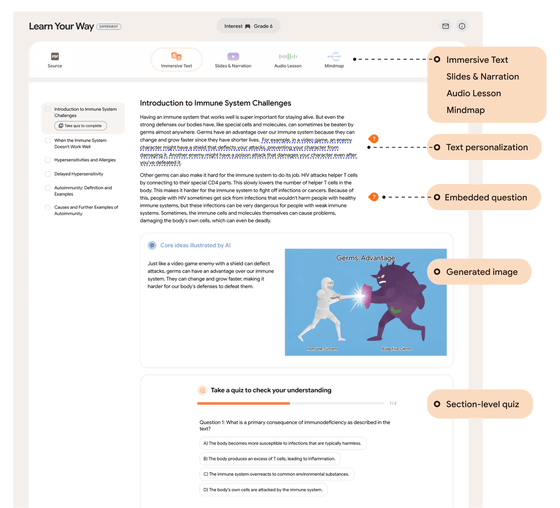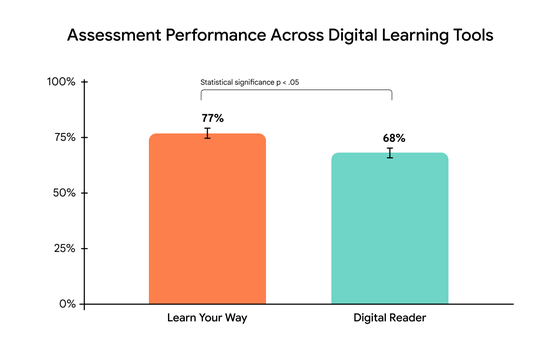Google reconstructs textbooks with generative AI for 'Learn Your Way'

The latest research exploring ways to use generative AI in the field of education has demonstrated that using generative AI to reconstruct textbooks can improve learners' learning outcomes. Taking advantage of this, Google has released ' Learn Your Way, ' a service that uses generative AI to reconstruct textbooks into better learning materials.
Learn Your Way: Reimagining textbooks with generative AI

Textbooks are the foundation of education, but they have fundamental limitations. Creating textbooks manually requires a significant amount of human effort, and Google points out that they lack 'alternative perspectives,' 'diverse formats,' and 'customized variations' to make textbook learning more effective and engaging. Google is researching ways to use generative AI to automatically generate 'alternative perspectives' and 'personalized examples' while maintaining the integrity of the material.
Google writes that advances in generative AI are bringing this vision closer to reality, and as part of that effort, it has announced 'Learn Your Way,' which it describes as 'a research experiment exploring how generative AI can transform textbooks and create more effective, engaging, and learner-led learning experiences for all students.'

Google's approach is two-fold: first, generating different multimodal representations of content that work together to enhance the learning experience, and second, taking foundational steps towards personalization.
According to
Additionally, Google is looking to reflect personalization, which is becoming an increasingly desirable standard in K-12 education. By tailoring educational content to students' demographics, Google aims to increase its relevance and effectiveness. Additionally, by incorporating a quiz feature that allows learners to further customize the experience based on their real-time responses, Google aims to engage learners and deepen their learning .
To achieve this, Google writes, a layered technology approach is required, using LearnLM , a suite of best-in-class pedagogy-based models directly integrated into Gemini 2.5 Pro. Learn Your Way is based on a proprietary 'personalization pipeline' and uses this pipeline to create 'multiple content representations.'
◆Personalization Pipeline
While regular learning materials are only leveled to the learner's declared grade level, Learn Your Way asks learners to select their interests (e.g., sports, music, food) in addition to their grade level. This strategically replaces generic examples with personalized examples tailored to the learner's declared interests. This replaced text serves as the foundation for generating all other expressions, effectively propagating the personalization effect and building a pipeline for further personalization.
The image below shows a typical text explaining Newton's laws (top) and how Learn Your Way has personalized it to fit the learner's profile (bottom). The same content is explained using the metaphor of a basketball in the left case, and the metaphor of a painting in the right case.

◆Multiple expressions of content
Learn Your Way personalizes the source (general text) and then generates multiple representations of the content. Some content representations, such as mind maps and timelines, directly use Gemini's extensive capabilities. Other features, such as narrated slides, require a more elaborate pipeline combining multiple specialized AI agents and tools to achieve effective educational results.
Finally, even state-of-the-art general-purpose image models have proven inadequate for specialized tasks like generating effective educational visuals. To overcome this, we are fine-tuning a purpose-built model for generating educational illustrations. The combination of a strong base model, a multi-stage agent workflow, and fine-tuned components will enable us to generate a wide range of high-quality multimodal representations for learning.
This allows the Learn Your Way interface to offer multiple personalized content presentations, including immersive text, section-level quizzes, slides and narration, audio lessons, and mind maps.
The characteristics of each content expression are as follows:
・Immersive text
It breaks content down into digestible sections and enhances them with generated images and embedded questions, which together transform a passive reading experience into an active, multimodal one aligned with the principles of learning science.
- Section-level quizzes
It promotes active learning by allowing users to interactively assess their learning and discover gaps in their existing knowledge.
Slides and narration
It offers a comprehensive presentation of the source material and includes engaging activities such as fill-in-the-blanks, as well as narrated versions that mimic the recorded lessons.
・Audio lessons
It provides simulated conversations between AI-powered teachers and students, combined with visual aids, that model how real learners engage with the material, including expressions of misunderstandings that can be clarified by the teacher.
Mind maps
Organize knowledge hierarchically, allowing learners to zoom in and out from the big picture to the details.
These content presentations give learners choice and are tailored to their selected grade level and personal interests. Throughout the learning experience, interactive quizzes provide dynamic feedback and guide students to revisit specific content areas where they struggle. Google described Learn Your Way's wide range of content presentations as 'a first step toward true personalization.'

To evaluate Learn You Way's educational performance, Google converted 10 diverse learning materials provided by OpenStax , a nonprofit educational technology initiative, into three different personalization settings. The source materials covered a variety of subjects, from history to physics. Three educational experts then evaluated the converted materials using educational criteria such as accuracy and comprehensiveness. Learn You Way's reconstructed materials received high marks.
A randomized controlled trial of Learn Your Way was also conducted with 60 students in Chicago, ages 15 to 18, with similar reading abilities. Participants were given up to 40 minutes to learn about adolescent brain development from a textbook and were randomly assigned to study using either Learn Your Way or a traditional digital PDF reader.
Immediately following the learning session, participants were quizzed, followed 3-5 days later by a retention assessment designed by educational experts as a good indicator of comprehension of the material. Additionally, participants were surveyed about their learning experience and participated in 30-minute qualitative interviews to gain deeper insight beyond the quantitative metrics.
Comparing test scores immediately after the study session, the Learn Your Way group (77% correct) scored an average of 9% higher than the Digital PDF Reader group (68% correct). Additionally, the Learn Your Way group also scored 11% higher on a memory assessment administered 3-5 days after study than the Digital PDF Reader group. The Learn Your Way group scored 78% correct, compared to 67% correct for the Digital PDF Reader group.

100% of students who used Learn Your Way said the tool made them more comfortable taking tests, compared to 70% of those who used a digital PDF reader. 93% said they would like to use Learn Your Way for future study, while only 67% said they would like to use a digital PDF reader for future study.
'The use of generative AI suggests that learning experiences are not only more effective, but also more engaging. By evolving static textbooks into interactive artifacts and giving learners more freedom to choose how they learn, retention rates improve,' Google writes.
In addition, Learn Your Way is actually available from the following site, and as a demonstration, personalized teaching materials in various fields such as economics, history, sociology, biology, chemistry, astronomy, computer science, philosophy, and psychology are available.
Learn Your Way
https://learnyourway.withgoogle.com/

The following research uses the generative AI that forms the basis of Learn Your Way to reconstruct textbooks.
[2509.13348] Towards an AI-Augmented Textbook
https://arxiv.org/abs/2509.13348
in Software, Web Service, Posted by logu_ii